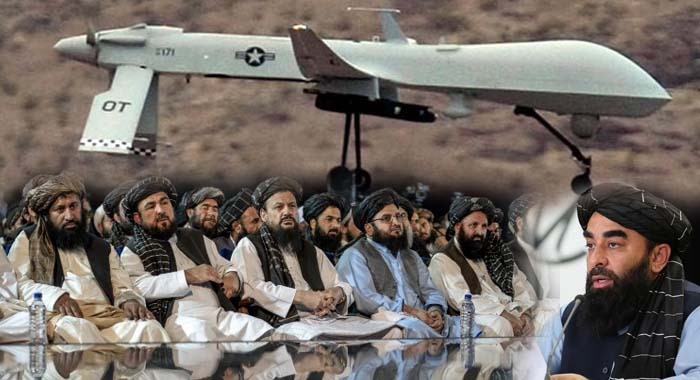A fresh round of accusations has emerged from the Taliban leadership, this time again framed as concerns over alleged United States drone flights in Afghan airspace. Speaking to Iran’s state-run broadcaster, Taliban spokesman Zabihullah Mujahid claimed that American drones have continued surveillance flights over Afghanistan since the Taliban takeover in August 2021. He complained that these drones enter Afghanistan by crossing through the airspace of unspecified neighbouring countries, a comment that was left intentionally vague yet suggestively pointed.
Mujahid reiterated that the Taliban, in meetings where they have access, have raised the issue with relevant parties and demanded that the flights be stopped immediately since, according to them, such operations violate Afghan sovereignty.
The deliberate ambiguity about which regional state is supposedly providing access to US drones is not new, and observers in Islamabad interpret it as another attempt by the Taliban to quietly malign Pakistan. This pattern has intensified despite Pakistan’s repeated and categorical clarifications that there is no such arrangement with the United States, nor any operational requirement to deny or confirm something that simply does not exist. Pakistani officials reminded the Taliban delegation during the recent Istanbul talks that Qatar has the only known, formal post-withdrawal arrangement with Washington, allowing the United States to operate certain counter-terrorism tasks from its soil. No such agreement exists with Pakistan, and the global diplomatic community would clearly know if one ever did.
Despite this, the Taliban leadership continues to drop hints in interviews and offstage briefings, a tactic many regional analysts see as an intentional pressure tool, used especially when Kabul seeks concessions or cover for its own internal failures, including the unchecked presence of TTP leaders on Afghan soil.
These renewed accusations also come at a time when various intelligence and diplomatic circles speculate that the Taliban are exploring new arrangements with the United States regarding the abandoned Bagram airbase. While nothing official has surfaced, the timing of Mujahid’s statements has led to theories that the Taliban might be creating noise about “foreign violations” in order to strengthen their bargaining position in any potential behind-the-scenes dialogue with Washington. By presenting themselves as victims of foreign intrusion, they seek to inflate political leverage at home and abroad.
Pakistan, however, remains the convenient target because the Taliban know it fits their narrative and serves India’s interests. The pattern is unmistakable. Each time pressure mounts on Kabul to act against the TTP, a new accusation appears about drone routes, border violations, or unnamed countries facilitating American access. The Taliban never identify these states directly, yet they ensure enough room for mischief, allowing India-backed propaganda networks to weaponize the ambiguity against Pakistan.
Regional officials believe such vague allegations are meant to divert attention from Kabul’s own responsibilities, particularly its refusal to act decisively against the TTP network that continues cross-border attacks into Pakistan from Afghan territory.
Mujahid’s latest interview is therefore not a simple complaint about drone flights. It represents another calibrated attempt by the Taliban to shift blame, increase their diplomatic value, and quietly pressure Pakistan, while leaving enough ambiguity for India’s information network to exploit. Until Kabul addresses its own internal contradictions, such accusations will likely remain a recurring tool in its regional politics.





